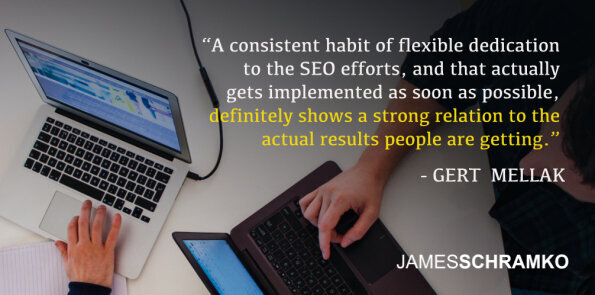Podcast: Download (Duration: 22:53 — 25.0MB)
Get Notified Of Future Episodes Apple Podcasts | Spotify | Amazon Music | Android | Blubrry | Gaana | TuneIn | Deezer | Anghami | RSS | More
Podcast highlights:
It’s one thing to get SEO advice – it’s a whole other beast to implement it, and to do it consistently. [00:55]
What if you’re coming late to the SEO game and have years and pages of content? [03:07]
SEOLeverage has almost 30 people working behind the scenes to help clients rank. What exactly do they do? [06:26]
So now you’ve got SEO and clicks are free, you can turn off the paid traffic, right? Not so fast. [08:39]
You don’t get fit by going now and then to the gym. Neither do you rank by putting intermittent effort into SEO. [09:50]
Here’s what we stand to learn from those who actually implement… [11:55]
Gert’s SEO app has been undergoing tweaks in the background. Where is it at to date? [13:04]
If you want to work with an agency, you’ll still need people. Here are the roles you’ll ideally have… [16:05]
There are some clients who you just know will do well with SEO. What have they got that others haven’t? [20:15]
Step up your marketing with James’s help
SEO expert Gert Mellak is a many-time repeat guest on James’s show, and his episodes get good feedback. It would seem SEO is not dead, but is in fact an ongoing interest of online business owners.
Where consistency gets results
Today, James wants to address the topic of SEO implementation. Because really, knowing what your site lacks SEO-wise won’t do you a lot of good unless you do what’s needed to fix it. And another important thing to know is SEO doesn’t work unless you have consistent implementation.
“SEO doesn’t work unless you have consistent implementation.” – James Schramko
Gert has been helping James and his team with the consistency part, regularly sending Loom videos and charts of things that need doing.
“It’s not enough to tick a few boxes on a plugin.” – Gert Mellak
When Gert’s SEO service started, they were mostly analyzing, running site audits. They still do, but have realized people really have trouble implementing their advice based on the results. It’s not enough, says Gert, to tick a few boxes on a plugin. Implementation is a little bit more. They line up tasks for their clients, prioritizing action items based on impact and effort. But then what’s really needed is a consistent process of execution.
What if you have a lot of content?
Is there any sort of formula or ration between the amount of content you create and the effort you need to put into optimizing it for SEO, asks James?
Gert isn’t about magic formulas, but about consistently tracking and monitoring what is actually happening on the site. At his agency, SEO Leverage, they have an app that shows them what things are working and what are not. So what articles are hardly getting traffic, but convert decently, and vice versa, and from there they can do something about it.
They’re really conversion-focused in the first place, and try to make decisions based on that. Many of their clients do have too much content, or at least more than they actually leverage.
For instance, one client came to them with 200 podcast episodes, and rather poorly described. They asked him from that point to not create new content, but focus all the resources of content marketing optimization onto the existing content. Because the existing content was amazing, just not in line with what Google actually wanted to rank.
They focused with the client’s team on redoing all those old blog posts, bringing them to today’s standards based on current user experience, expectations and structure, etc. And they began to rank really, really well. So if you have created content in the past, very often, it’s just a matter of really leveraging it for SEO purposes.
Then obviously, promotion on other channels is a big part. If you get just a few page views here and there for the content you or a team mate have spent a day on, it’s not the kind of leverage you want.
The vital element of team
Now, Gert has a team, who help prepare a summary for James of what needs to be done on his site. And Gert integrates with James’s team, who get the tasks done. But not everyone has a team. So who is Gert’s “we” typically at SEOLeverage.com?
While Gert and his crew work directly with some of their clients’ teams, there are some clients who don’t have the manpower. So over the years SEOLeverage has built up a team of close to 30 people who implement stuff. They have a content writing team, implementers, consultants, a link building team.
Roughly half of Gert’s clients work from Gert’s instructions, like James and his team. The other half rely on Gert’s team to do the SEO implementation, and really just approve things or answer questions about their target market.
The SEO then becomes largely independent of what the client may be doing. Because come Christmas or other holidays, come changes in situation, consistent implementation needs to happen for SEO to succeed.
How paid traffic fits in the picture
James has seen some people not needing paid traffic channels with SEO. If you took a big website like his, however, and optimized it for conversion and ranking, you could actually direct paid traffic to it and get a sort of magnifier effect, right?
Absolutely, says Gert. They never recommend turning paid channels off, although it’s often the first thing people ask for when they want to build up SEO.
SEO doesn’t happen that fast. And when it works, you get better cost per acquisition, better cost per lead on average. It doesn’t make too much sense then to turn off a traffic channel that’s actually working at a reasonable cost for you.
The fitness analogy, and why SEO is not about a keyword
So Gert’s app gathers data, tells Gert and his team what needs focus, Gert tells the client, client and or team implements what’s needed, and the cycle repeats. And this, over time, keeps the SEO fit, like health, asks James?
It is very similar to fitness training, says Gert. Going to the gym once in a while in a year won’t make you fitter or healthier. Same with SEO. You need to put in the consistency, and at some point, results kick in.
It’s what SEO really requires. You need to optimize the same article multiple times a year, possibly. If it’s one of the conversion-driving articles, you need to figure out where you can target the right audience in a better way. And this is something that’s consistent.
 There are updates all the time on Google, and you need to readjust your SEO plan of action. It’s a moving target. And the closer you are to what’s actually happening in a competitive landscape, the better you can really adjust.
There are updates all the time on Google, and you need to readjust your SEO plan of action. It’s a moving target. And the closer you are to what’s actually happening in a competitive landscape, the better you can really adjust.
Also, says Gert, it’s really not about those keywords. Every page might be ranking for 500, 5,000 different keywords. This is something people very often don’t realize – they want to rank one page for one keyword. But a page could be ranking for hundreds of variations of a keyword, possibly. So just aiming at one single ranking and defining the success or failure of an SEO campaign by one specific ranking is not leveraging the entire potential there.
What you can learn from the implementers
So considering the clients of Gert’s who are good at implementation, what can we learn from them?
They can get hundreds, sometimes thousands of email leads a month with consistent implementation, Gert says. And we can learn that they either have an SEO-focused team in place, regularly updating articles that drive conversions, or they rely on the SEO Leverage team to do so.
 They are also flexible when it comes to testing new things. A consistent habit of flexible dedication, so to speak, to the SEO efforts, and that actually gets implemented as soon as possible, definitely shows a strong relation to the actual results people are getting.
They are also flexible when it comes to testing new things. A consistent habit of flexible dedication, so to speak, to the SEO efforts, and that actually gets implemented as soon as possible, definitely shows a strong relation to the actual results people are getting.
How Gert’s app has been doing
How good these days is SEO Leverage’s app? James knows Gert has been working on it a lot in the background.
They’re adding new tweaks and features all the time, says Gert. It can now figure out a lot for clients by cross-referencing data from different points, be it their competitors or their conversion data.
Google Search Console shows them what kind of keywords a certain URL comes up. They can cross-reference how your ads are going up and down during the different months. They can have testing features, they crawl the website, they have trackings on whether a different title brings higher clickthrough rates. So there are a lot of features, all focused on execution.
It’s not an analysis tool where you spend hours looking at data like you might with Ahrefs, or with Google Analytics. It fetches the most important KPIs and tries to make sense of them.
Say all keywords that contain, maybe in James’s case, revenue share, are moving up – this is an important indicator. And if they move down, it’s another indicator. You just need to see how relevant you are over time. And with green and red highlighting in the app, you can see at one glance, what is actually happening. Where am I getting my conversion? Where am I in the red?
“It’s just so easy to spend money in SEO on an area that doesn’t make sense, that doesn’t really move the needle.” – Gert Mellak
Some of Gert’s clients come to them with optimized images and great site speed, wondering what to do next. But they should probably just have focused on five articles that drive the conversions. It’s just so easy to spend money in SEO on an area that doesn’t make sense, that doesn’t really move the needle. And it takes some machine learning these days, and hopefully soon, artificial intelligence in Gert’s app as well, to figure out some things that actually make sense across the entire data set.
The roles you’ll need to work with an agency like Gert’s
Say an e-commerce store owner wants to hire SEOLeverage.com to handle their SEO action plan. What kind of team would they need on their side to get the job done?
The first one, for Gert, is always a tech service, so you don’t have to worry about the tech of the website. You don’t have to worry about caching speed and the like. This is also the only thing he and his team can’t really take over. They always rely on someone being able to maintain the tech. And they recommend a team rather than an individual person for this.
Next, you want a content creator, not only a writer but also someone who does images. Visual aspects, are more and more important.
You want a strategy person or an SEO, which is very often the role Gert’s team take when they guide the strategy with the app for their clients.
And you want to have a link builder. You really want someone who knows how to do this, and has been doing this for a while, says Gert, because it is really hard to train someone up from scratch.
SEO Leverage has a link building team in house. They have been doing the work for many, many years. And, Gert says, you also need the tools, the context, the relationships with other site owners, etc., to make this happen. In-house link building can be done, but you want someone who has the connections already and comes to your team, or outsource it to a trusted service.
The client you just know will do well
Is there an ideal type of client Gert generally works with who he just knows will go well?
They have different types of clients, says Gert. A lot of Shopify sites, for example. They have a lot of potential because Shopify out of the box is not really SEO-optimized. So ecommerce, definitely. They work with coaches, membership sites, online courses. Those are probably their most common types of clients. Also some B2B service providers are getting great value, because they just build up the top of the funnel. Agencies, possibly, as well. Coaching, consulting areas.
And is there a size, either team or revenue-wise, that starts to work?
Probably, Gert says. The middle six figures is definitely a good start, because you can dedicate the necessary resources to the team, to an agency, and the possible additional costs for link building, content writing, etc.
Before that, just with guidance, you can already get quite far as well, if you work just on your own or with your small team.
If you’re considering SEO services…
So on the topic of SEO implementation, what’s Gert’s best advice for someone thinking about getting SEO services?
 Gert would say, it’s really important to understand, you harvest what you implement in SEO. They’ve had clients get the greatest suggestions and the greatest strategies, and everything happily mapped out, but who were not able to implement. If you can’t implement every week, or every two weeks, what’s been lined up, it’s probably better to look for a different way to work.
Gert would say, it’s really important to understand, you harvest what you implement in SEO. They’ve had clients get the greatest suggestions and the greatest strategies, and everything happily mapped out, but who were not able to implement. If you can’t implement every week, or every two weeks, what’s been lined up, it’s probably better to look for a different way to work.
This can be either outsourcing the implementation, or choosing a completely different strategy channel. Otherwise, expecting SEO results without a consistent implementation is just not going to happen.
If you’ve got SEO questions for Gert or need help with your SEO campaign, look him up at SEOLeverage.com.
Enjoy access to world-class business coaching inside the James Schramko membership
Liked the show? Enjoy all the episodes when you subscribe on iTunes









Leave a Reply